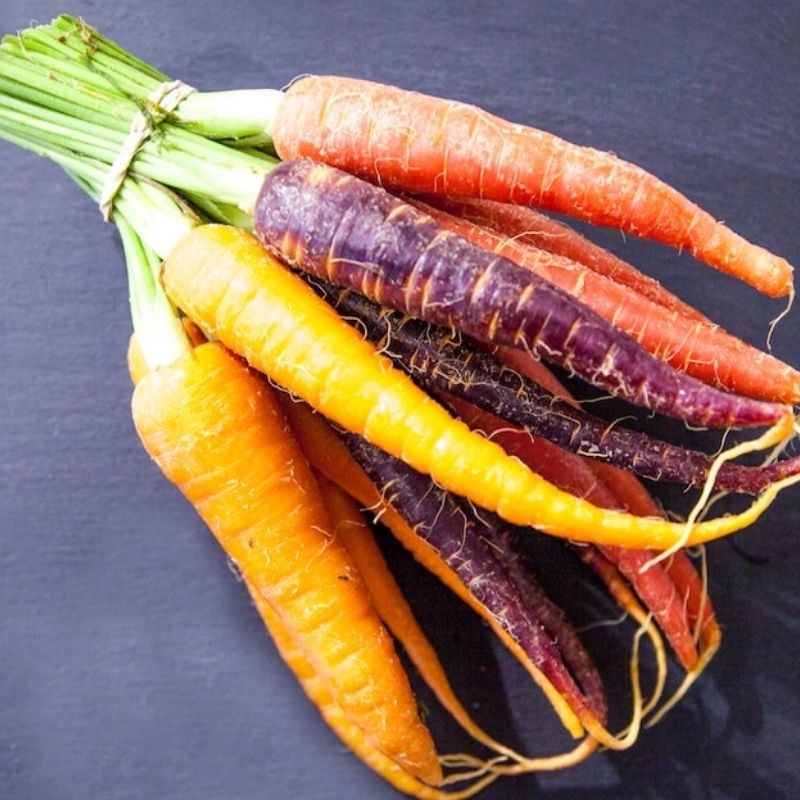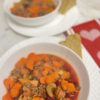
Eating in season may be your new BFF
Eating in season has a ton of health benefits, and couple that with the delicious produce of fall, and you have got yourself a deal you cannot pass up. In this post, we’re covering why you should eat in season, what’s in season this fall, and the health benefits of these foods, plus low-histamine and low-fodmap fall-friendly produce.
Why eat in season?
Eating in season isn’t just trendy; there are actual benefits of why you should pick produce that is naturally grown and harvested in the time of year that you’re eating it. In short, eating in season is better for your health, tastes better, is environmentally friendly, and is cheaper.
What produce is in season in the fall?
There are TONS of fruits and veggies that are in season in the fall. Some produce like apples and pumpkins are notoriously popular in this time of year, but so many others go unnoticed and reap health benefits.
Hormone Healthy Foods
- Apples, butternut squash, brussel sprouts, cauliflower, and cinnamon are foods that may help balance your hormones due to their chemical properties.
- Apples contain pectin, which helps to maintain healthy bowels and, in turn, helps your body with detoxification.
- Butternut squash is packed with B vitamins and minerals (like magnesium, calcium, iron) that promote hormone health.
- Brussel sprouts have 13C, which may help to reduce the risk for estrogen-sensitive breast cancer.
- Both brussel sprouts and cauliflower have indole-3-carbinol, which is key for phase one liver detox.
- Lastly, cinnamon contains cinnamaldehyde, which helps balance hormones and blood sugar and may lower testosterone in women.
Cell Healthy Foods
Arugula isn’t just a great pizza topper. Arugula is full of cell-healthy benefits due to its nutrients. Specifically, arugula is a good source of Vitamin A, Vitamin K, Folate, phytochemicals, and carotenoids. Phytochemicals work to fight free radical damage, which is why arugula can be cancer-protecting. In addition to phytochemicals, arugula contains other cancer-fighting nutrients such as glucosinates and isothiocyanates.
Beets may not be the most popular vegetable, but it has an impressive nutrient profile. Beets are high in antioxidants, phytonutrients, Vitamin C, Folate, and trace minerals. Betalains give beets their distinct color and are a type of phytonutrient that has anti-inflammatory effects on the body by reducing oxidative stress. Similar to arugula, the phytochemicals in beets are also cancer-protecting. In addition, athletes may consume beets for their performance benefits. Beets contain nitrates which aid the mitochondria, the cell’s powerhouse for energy, resulting in improved performance and recovery.
Butternut squash is a fall favorite for many. This is because butternut squash has high amounts of Vitamin A, Vitamin C, trace minerals such as Manganese, Potassium, Magnesium, and antioxidants. Not to mention that squash boasts anti-inflammatory effects thanks to its Vitamin A, Vitamin C, and antioxidants: beta-carotene, alpha-carotene, and beta-cryptoxanthin. In turn, butternut squash is a great addition to help strengthen your immune system. Interestingly, butternut squash also contains a protein, called Moschatin, which may be anti-cancerous.
Other great, healthy, and yummy foods in season include but are not limited to:
- Broccoli
- Carrots
- Celery
- Cabbage
- Eggplant
- Parsnips
- Turnips
- Zucchini
- Potatoes
- Pears
- Pomegranates
- Figs
- Grapes
- Garlic
- Mushrooms
Note that many of the foods listed above have similar benefits as the foods listed above, and definitely have other great benefits on cell health!
Low-histamine fall produce
For all the people out there on a low-histamine diet, fall has tons of produce to offer! Here are some great low-histamine options:
- Apples
- Arugula
- Brussels
- Broccoli
- Beets
- Butternut squash
- Carrots
- Cabbage
- Cauliflower
- Celery
- Parsnips
- Pomegranate
- Turnips
- Garlic
- Figs
- Sweet Potato and Potatoes
- Zucchini
Just beware that the fall favorite, pumpkin, is a higher histamine food. Additionally, mushrooms and eggplant are also higher histamine foods.
Low-fodmap fall produce
Switching gears to fall low-fodmap friendly produce. Unfortunately, the list gets a bit more selective here. The key here is portion size. Many of these foods can be tolerated only to a certain extent before becoming problematic.
Low-fodmap friendly fall produce:
- Carrots
- Kale
- Parsnips
- Pumpkin
- Potatoes
- Zucchini
- Cabbage – up to ¾ cup
- Celery – up to 5cm of stalk
- Butternutsuwah – up to ¼ cup
- Broccoli – up to ¾ cup
- Eggplant – up to 1 cup
- Sweet potato – up to ½ cup
Friendly reminder that even though research has found these portion sizes to be tolerable, everyone is different! Introduce these foods one at a time and tune into how your body feels! It may be that your body is fine, can tolerate less or more, or maybe even not at all.
Fall Spices to Focus On
Lastly, are fall spices! I always find fall spices to be so exciting, warming, and yummy!
Some of our favorites are below (and their health benefits):
- Allspice – may help with digestion and reduce inflammation
- Cardamom – may help to lower blood pressure, reduce inflammation, and protect against cancer
- Cinnamon -may help with hormone and blood sugar balancing
- Cloves – may help regulate blood sugar, reduce inflammation, protect against cancer, and promote liver health
- Ginger – aids in digestion, reduces nausea, anti-inflammatory, and anti-microbial properties
- Nutmeg – may reduce inflammation and have anti-microbial properites,
- Pumpkin spice – tastes delish!
- Saffron – may be protective against cancer, improve mood, and reduce inflammation
The Bottom Line
Each produce item is packed with nutrients your body will love. Eating a diverse range of foods ensures your body is getting the fuel it needs! Do your best to incorporate seasonal produce into your diet this fall. Your cells and taste buds won’t regret it!
Want to learn more? Click here to work with us!







